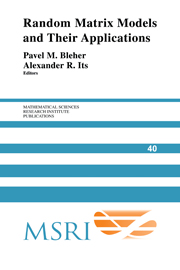Book contents
- Frontmatter
- Contents
- Preface
- Symmetrized Random Permutations
- Hankel Determinants as Fredholm Determinants
- Universality and Scaling of Zeros on Symplectic Manifolds
- z-Measures on Partitions, Robinson-Schensted-Knuth Correspondence, and β = 2 Random Matrix Ensembles
- Phase Transitions and Random Matrices
- Matrix Model Combinatorics: Applications to Folding and Coloring
- Interrelationships Between Orthogonal, Unitary and Symplectic Matrix Ensembles
- Dual Isomonodromic Tau Functions and Determinants of Integrable Fredholm Operators
- Functional Equations and Electrostatic Models for Orthogonal Polynomials
- Random Words, Toeplitz Determinants, and Integrable Systems I
- Random Permutations and the Discrete Bessel Kernel
- Solvable Matrix Models
- The τ-Function for Analytic Curves
- Integration over Angular Variables for Two Coupled Matrices
- Integrable Lattices: Random Matrices and Random Permutations
- SL(2) and z-Measures
- Some Matrix Integrals Related to Knots and Links
Hankel Determinants as Fredholm Determinants
Published online by Cambridge University Press: 25 June 2025
- Frontmatter
- Contents
- Preface
- Symmetrized Random Permutations
- Hankel Determinants as Fredholm Determinants
- Universality and Scaling of Zeros on Symplectic Manifolds
- z-Measures on Partitions, Robinson-Schensted-Knuth Correspondence, and β = 2 Random Matrix Ensembles
- Phase Transitions and Random Matrices
- Matrix Model Combinatorics: Applications to Folding and Coloring
- Interrelationships Between Orthogonal, Unitary and Symplectic Matrix Ensembles
- Dual Isomonodromic Tau Functions and Determinants of Integrable Fredholm Operators
- Functional Equations and Electrostatic Models for Orthogonal Polynomials
- Random Words, Toeplitz Determinants, and Integrable Systems I
- Random Permutations and the Discrete Bessel Kernel
- Solvable Matrix Models
- The τ-Function for Analytic Curves
- Integration over Angular Variables for Two Coupled Matrices
- Integrable Lattices: Random Matrices and Random Permutations
- SL(2) and z-Measures
- Some Matrix Integrals Related to Knots and Links
Summary
Hankel determinants which occur in problems associated with orthogonal polynomials, integrable systems and random matrices are computed asymptotically for weights that are supported in an semi-infinite or infinite interval. The main idea is to turn the determinant computation into a random matrix “linear statistics” type problem where the Coulomb fluid approach can be applied.
1. Introduction Let w be a weight function supported on L (a subset of ℝ) that has finite moments of all orders
With w(x) we associate the Hankel matrix, where i, j = 0 , … , n—1. The purpose of this paper is the determination of
for large n with suitable conditions on w. If L is a single interval, say [—1,1], then the asymptotic form of such determinants was computed by Szego [1918] and later by Hirschmann [1966] for quite general w.
Our main result is as follows. Suppose we replace w(x) by a function given in the form wo(x)U(x) where w0(x) is the weight e-xxv. Then for appropriate functions w, the determinants are given asymptotically as n → ∞ by
and G is the Barnes function (see Section 2).
In Section 2 we establish an identity relating Dn[w], Dn[wo], and a certain Predholm determinant and a description of the Predholm determinant from a “linear statistics” point of view. A computation of Dn[wo] is also included. Then in Section 3 the Coulomb fluid approach is used to compute the asymptotics of the Predholm determinant. This, along with the computation of Dn[wo] allows us to give a heuristic, Coulomb fluid derivation of the formula.
Information
- Type
- Chapter
- Information
- Random Matrix Models and their Applications , pp. 21 - 30Publisher: Cambridge University PressPrint publication year: 2001
